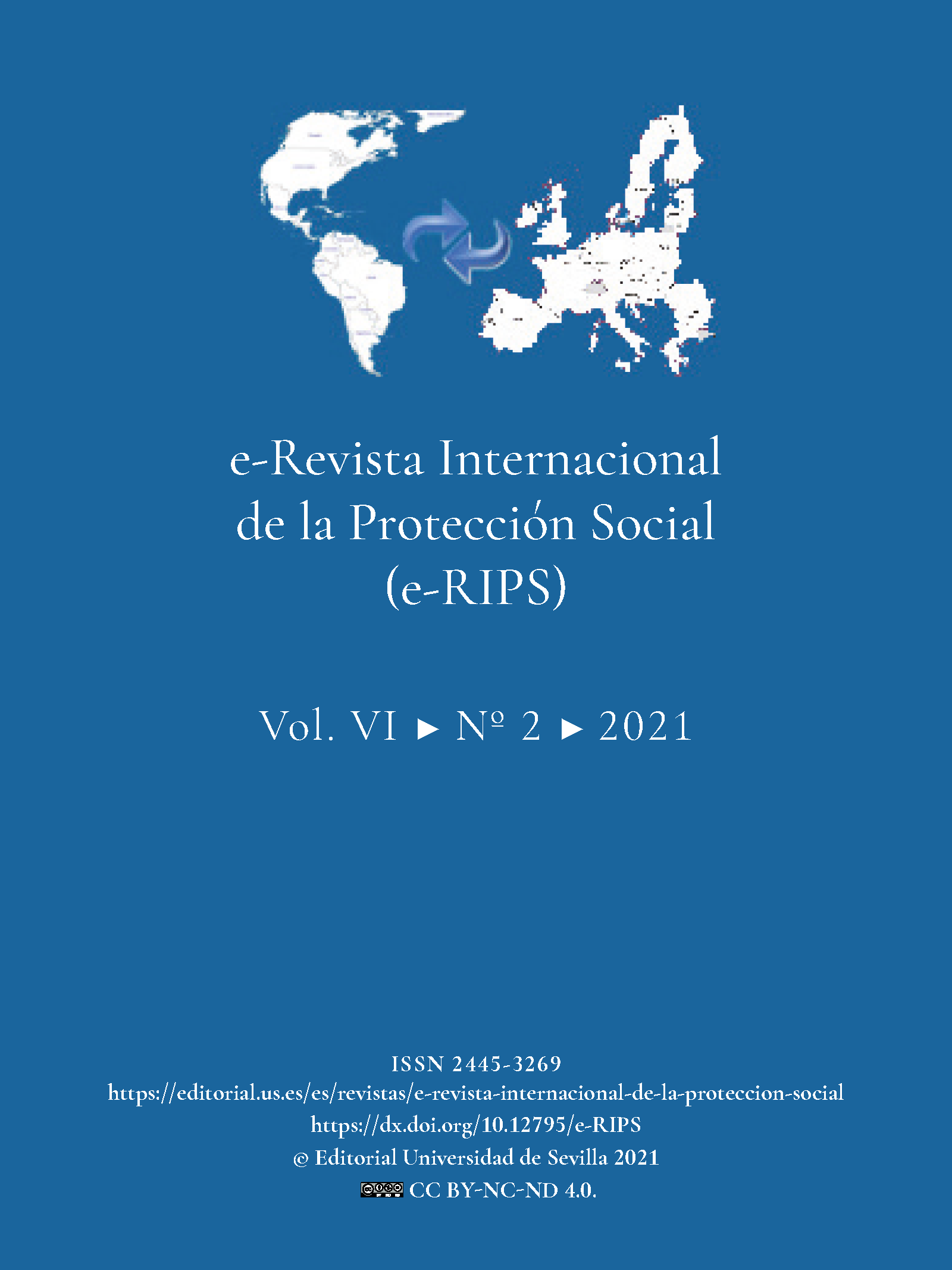Los efectos del Brexit en la coordinación en materia de Seguridad Social: del régimen privilegiado del Acuerdo de Retirada a la coordinación limitada del Acuerdo de Comercio y Cooperación
DOI:
https://doi.org/10.12795/e-RIPS.2021.i02.05Palabras clave:
Brexit, Coordinación, Seguridad social, Acuerdo de Retirada, Acuerdo de Comercio y CooperaciónResumen
El Brexit ha generado gran expectación en muchos ámbitos, incluido el normativo. El proceso de negociación ha sido arduo, pero, finalmente, Reino Unido y la Unión Europea han conseguido llegar a dos acuerdos: uno para regular sus relaciones, a modo transitorio (el Acuerdo de Retirada); y otro, orientado a regir sus relaciones a largo plazo (el Acuerdo de Comercio y Cooperación). Ambos textos incluyen disposiciones en materia de coordinación de los sistemas nacionales de Seguridad Social, pero nada coincidentes, por lo que requieren un tratamiento diferenciado. El objetivo de este texto es exponer las bases del Brexit y cómo estas se han dejado sentir en estos acuerdos, sobre todo, en el segundo. Asimismo, se expondrán sucintamente las principales características del régimen de coordinación en materia de Seguridad Social al amparo de cada uno de estos Acuerdos.
Descargas
Citas
Burriel Rodríguez-Diosdado, P.: “Las obligaciones de las personas beneficiarias del Ingreso Mínimo Vital: las infracciones y sanciones previstas y su posible incidencia en la coordinación de prestaciones de la Seguridad Social a nivel europeo”, e-Revista Internacional de la Protección Social, vol. V, núm. 2, 2020.
Carrascosa Bermejo, D.: “Capítulo 19. Coordinación de los sistemas nacionales de Seguridad Social (Reglamentos CE/883/2004 y CE/987/2009)”, en Casas Baamonde, M. E. y Gil Alburquerque, R. (dirs.): Derecho Social de la Unión Europea. Aplicación por el Tribunal de Justicia, Francis Lefebvre, Madrid.
Carrascosa Bermejo, D.: “Key Ideas on Mobility and Social Security after Brexit”, ERA Forum, 2021.
Díaz-Gálvez, J.; Álvarez-Novoa, M.; Pérez Fontes, C. (dirs.): El desplazamiento de trabajadores al extranjero: su régimen jurídico, laboral y fiscal, Lex Nova, Valladolid, 2000.
García de Cortázar y Nebreda, C.: “La Unión Europea y el Reino Unido. Brexit. La regulación laboral y de Seguridad Social a partir del 31 de diciembre 2020. «Condenados a entenderse»”, Actum Social, núm. 168, 2021.
García de Cortázar y Nebreda, C.: “Quo Vadis Tutela Socialis Operarium Migrantium Europae. Cameron dixit”, Revista de Derecho de la Seguridad Social, núm. 3, 2015.
Gardeñes Santiago, M.: “La circulación de personas físicas en el Acuerdo de Retirada del reino Unido de la Unión Europea”, Revista Electrónica de Estudios Internacionales, núm. 40, 2020.
Górriz López, C.: “Brexit: pasado, presente y futuro”, Cuadernos de Derecho Transnacional, vol. 13, núm. 1, 2021.
Gower, M.; Jozepa, I.; Fella, S.: After Brexit: visiting, working and living in the EU, House of Commons Library, Briefing paper number 9157, de 5 de marzo de 2021.
Guerrero Padrón, T.: “Ingreso Mínimo Vital y nacionales británicos en España en tiempos del Brexit”, e-Revista Internacional de la Protección Social, vol. V, núm. 2, 2020.
Kessler, F.: “Pratiques Professionnelles: Social; Gestion du personnel et vie de l’entreprise”, La Revue Fiduciare, Feuillet Hebdo núm. 3884, de 25 de marzo de 2021.
Lhernould, J. P.: “Les règlements coordonnant les systèmes nationaux de sécurité sociale : nouvelles lignes de force et points de rupture. À propos de la proposition de la Commission du 13 décembre 2016”, Revue Trimestrielle de Droit Européen, vol. 54, núm. 1, 2018.
Martín-Pozuelo López, Á.: “Crónica de un “Brexit” anunciado: análisis de las causas sociales y su judicialización”, Revista de la Sala Segunda de la Corte Suprema de Justicia de Costa Rica, núm. 15, 2018.
Miranda Boto, J. M.: “Capítulo 3. La libre circulación de trabajadores en la Unión Europea”, en Cardenal Carro, M. y Pérez Campos, A. I. (dirs.): Derecho del Trabajo y protección social en la Unión Europea: situación actual y perspectivas de futuro, Dykinson, Madrid, 2019.
Navarro Galván, M. A.: “Las raíces del Brexit: institucionalización del euroescepticismo”, Geopolítica(s). Revista de estudios sobre espacio y poder, vol. 12, núm. 1, 2021.
Sánchez-Rodas Navarro, C.: “El ingreso mínimo vital a la luz del derecho de la Unión Europea y de los convenios internacionales de Seguridad Social vigentes en España”, Cuadernos de derecho transnacional, vol. 13, núm. 1, 2021.
Sánchez-Rodas Navarro, C.: “La aplicación del derecho de la Unión Europea al Ingreso Mínimo Vital”, en Ortiz Castillo, F. (coord.) y Sánchez-Rodas Navarro, C. (dir.): Los reglamentos de coordinación de sistemas de seguridad social en la Unión Europea, Editorial Laborum, Murcia, 2021.
Tarabini-Castellani Aznar, M.: “Libertad de circulación y prestaciones asistenciales durante los tres primeros meses de residencia: La primacía de una libre circulación sostenible frente a la libre circulación de trabajadores”, Trabajo y Derecho, núm. 23, 2016.
VV.AA.: “Parte III. Capítulo XXXVIII. Trabajadores migrantes”, en VV.AA.: Memento práctico Francis Lefebvre Seguridad Social, Francis Lefebvre, Madrid, 2020.
Publicado
Cómo citar
Número
Sección
Licencia
e-Revista Internacional de la Protección Social es una revista de acceso abierto, lo que significa que todo su contenido está disponible gratuitamente para el usuario o su institución. Los usuarios pueden leer, descargar, copiar, distribuir, imprimir, buscar o enlazar con el texto completo de los artículos, o utilizarlos para cualquier otro fin lícito, sin solicitar permiso previo al editor o al autor. Esta definición de acceso abierto se ajusta a la Iniciativa de Acceso Abierto de Budapest (BOAI).
 4.0
4.0
A menos que se indique lo contrario, todo el contenido de la edición electrónica se distribuye bajo una " licencia internacional Creative Commons Atribución-Nocomercial-Compartirigual 4.0 Internacional". Puede consultar la versión informativa y el texto legal de la licencia aquí. Esto debe indicarse expresamente de esta manera cuando sea necesario.
En caso de aceptación del manuscrito, los autores ceden los derechos de la obra para su publicación a eRIPS. Revista Internacional de la Protección Social bajo el contrato de licencia Reconocimiento-NoComercial-CompartirIgual 4.0 Internacional (CC BY-NC-SA 4.0). Los autores conservan los derechos de autor y terceros están autorizados a compartir y adaptar la obra, siempre que cumplan con los términos y condiciones establecidos en la licencia.
- Usted debe dar crédito de manera adecuada , brindar un enlace a la licencia, e indicar si se han realizado cambios . Puede hacerlo en cualquier forma razonable, pero no de forma tal que sugiera que usted o su uso tienen el apoyo de la licenciante.
- Usted no puede hacer uso del material con propósitos comerciales .
- Si remezcla, transforma o crea a partir del material, debe publicar sus contribuciones bajo la misma licencia que el original.
Se puede encontrar más información en https://creativecommons.org/licenses/by-nc-sa/4.0/deed.es
Se permite y recomienda a los autores/as difundir su obra a través de Internet (p. ej.: en archivos telemáticos institucionales o en su página web) antes y durante el proceso de envío, lo cual puede producir intercambios interesantes y aumentar las citas de la obra publicada.











